
Exposé Online
What's old
Exposé print issues (1993-2011)
- 1 (October 1993)
- 2 (February 1994)
- 3 (May 1994)
- 4 (August 1994)
- 5 (October 1994)
- 6 (March 1995)
- 7 (July 1995)
- 8 (November 1995)
- 9 (March 1996)
- 10 (August 1996)
- 11 (February 1997)
- 12 (May 1997)
- 13 (October 1997)
- 14 (February 1998)
- 15 (July 1998)
- 16 (January 1999)
- 17 (April 1999)
- 18 (November 1999)
- 19 (May 2000)
- 20 (October 2000)
- 21 (March 2001)
- 22 (July 2001)
- 23 (December 2001)
- 24 (April 2002)
- 25 (September 2002)
- 26 (February 2003)
- 27 (August 2003)
- 28 (December 2003)
- 29 (April 2004)
- 30 (September 2004)
- 31 (March 2005)
- 32 (September 2005)
- 33 (May 2006)
- 34 (March 2007)
- 35 (January 2008)
- 36 (October 2008)
- 37 (July 2009)
- 38 (July 2010)
- 39 (Summer 2011)
Features
A Bass of Many Colors —
The Tony Levin Interview
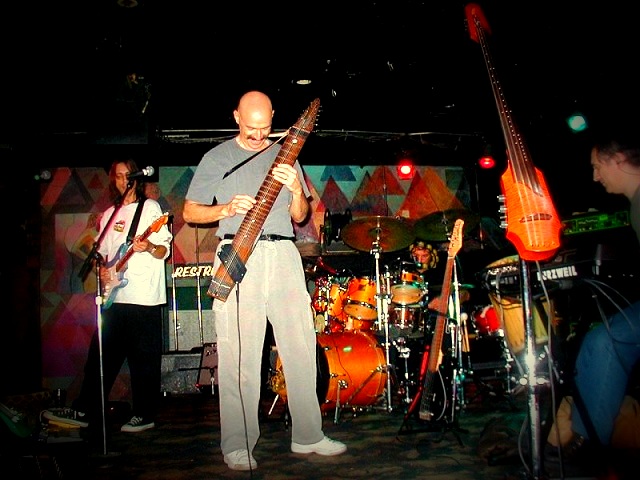
For more than two decades, Tony Levin has been one of the most sought-after bassists in the world, both within the progressive genre and elsewhere. His work with King Crimson and Peter Gabriel is enough to assure him a place in musical history, but there is so much more, from session work on pop albums to small-profile jazz projects. His résumé fills many pages, and even he can't remember every album he's played on.
by Jon Davis, Jeff Melton, Published 2001-07-01
photography by Danette Davis
The first album under your own name, World Diary, was really a collection of collaborations, as were From the Caves of the Iron Mountain and Bruford Levin Upper Extremities, so this current record, Waters of Eden, is your first as a leader. Is this something you've wanted to do for a while, and do you see yourself taking this role more in the future?
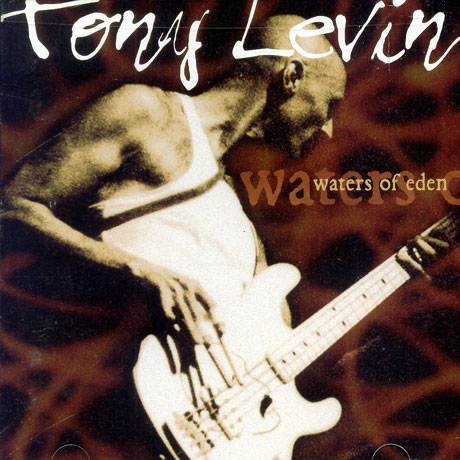 Well, it isn't something I've wanted to do for a long time. It is very different than writing collaboratively, which is the way I've done my other three albums on Papa Bear Records. It's very different than – We all like being in control, so it was fun and I'd say I had a nice time with it. I don't really know if my next album will be this kind, where I do the compositions and then get the correct players to play each piece, or whether I'll go back to collaboration. So I'm not really on a direction of continuing this way necessarily. However I would say that I felt good about my kind of learning the craft of composition, and I will continue to compose. In fact I have been, regardless of whether it's on my next album or not. So sooner or later I'll find some outlet for my composition-styled work.
Well, it isn't something I've wanted to do for a long time. It is very different than writing collaboratively, which is the way I've done my other three albums on Papa Bear Records. It's very different than – We all like being in control, so it was fun and I'd say I had a nice time with it. I don't really know if my next album will be this kind, where I do the compositions and then get the correct players to play each piece, or whether I'll go back to collaboration. So I'm not really on a direction of continuing this way necessarily. However I would say that I felt good about my kind of learning the craft of composition, and I will continue to compose. In fact I have been, regardless of whether it's on my next album or not. So sooner or later I'll find some outlet for my composition-styled work.
How did it come to be released on Narada?
Good question. First came the musical idea, and I was intending on releasing it on my own Papa Bear Records, and near the beginning of when I had an idea what I was going to do musically, Narada coincidentally came to me and asked me if I'd like to do an album for them. I'm asked this every few years by different companies, and usually I don't want to. This time I thought, "Well, wait a minute, maybe this kind of music will suit them, and if it doesn't, then let's talk about it, because I don't really want to do a different kind of music. But let's talk about it." Really I just sent them tapes of the early versions of the pieces – they liked it very much and even though I love having the artistic control of releasing it on Papa Bear Records, I was kind of thrilled to see someone else pay the money for manufacturing it. And also Narada Records can distribute in a store without [me] getting too into business, which is very different than the musical stuff. The fact is, I don't distribute my records, I only sell them on the web, which is nice, but it's a pleasure to know that there are some stores around the country that actually have this record.
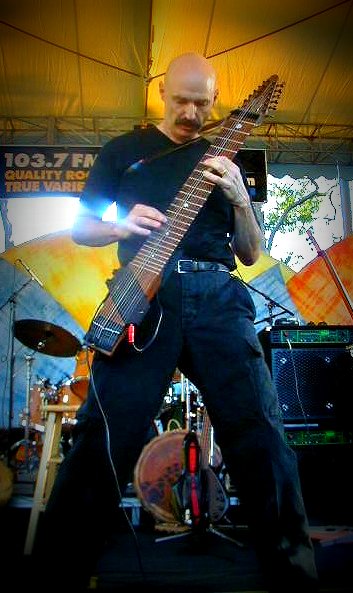 On your web site, on the page about Waters of Eden, you said you originally had concerns about recording it entirely digitally. How do you feel it worked out in the end?
On your web site, on the page about Waters of Eden, you said you originally had concerns about recording it entirely digitally. How do you feel it worked out in the end?
Fine, sonically it was fine. My fears were probably ungrounded. I'll never really know, because it was a sonic thing, not a musical thing. I brought in a very good engineer named David Bottrill, who has done a lot of world music with me, and does some of the Peter Gabriel albums I particularly like. I brought him in to mix at the end, or to remix it, even though I had a very good engineer, Robert Frazza, who did the recording. So I knew that David's fresh ears to the project and his analog taste would just alleviate me of that worry. I knew if he heard some little tendency towards it sounding digital, he'd correct it. Either he did, or he didn't hear it – I'll never really know or care. I was in good hands and so I could stop worrying about that. I know it was a lot more difficult way to mix it. It would have been very easy – it was already mixed on digital audio, and it was ready to just put onto better quality tape. But instead we went into a very well equipped studio, Bearsville Studios in New York, and spent quite a bit of money and time putting things through different amplifiers and onto different kinds of tape.
How did you choose the pieces to play on this current tour?
This leg of the tour having just – we just finished [the previous leg] in the end of June, so really we're not changing anything just yet. It's the same. We haven't even seen each other as a group. That's why this sound check is so difficult. We'll start off, especially tonight, exactly where we left off. At the end of four days we might have added another piece or two or subtracted something – we'll vary it a little bit. Frankly, the Stick is having some technical difficulties, so we might not do one of the pieces I might have done on Stick, but to tell you the truth it's a little hard to tell until sound check is over which pieces we'll do. We will undoubtedly try to do – as we did before – a variety of things. A lot of music from the album and some Peter Gabriel music and some King Crimson as you just heard, and something very new that nobody's heard, and even if we can throw in an improv we will. Maybe we'll do "Back in New York City," a Genesis piece that I did on the very first Gabriel tour. So, as you can tell, we're not quite sure what we'll do, but we have a fairly good idea.
So you leave it open for some spontaneity.
We usually have at least an introduction, if not a whole piece, that's improvised, but not nearly as much improvisation as, say King Crimson, where maybe a quarter of the show is improvised.
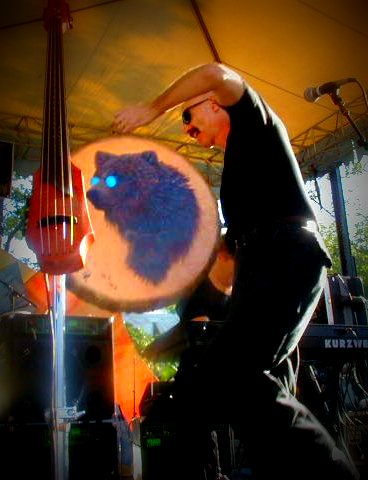 How did you arrange the pieces for the instrumentation available on the tour?
How did you arrange the pieces for the instrumentation available on the tour?
I left that to each guy. Frankly, they had all played on the record except for Jesse Gress. They had to learn how to combine the different parts that were played, or play exactly what they played. I really left each thing up to each guy. For me it was easy – I just play pretty much what I played on the record. I think I had the easiest time with that. The hardest time was Larry Fast, who had to combine maybe three synthesizer parts into one. And he did it and he probably has one playing on a sequencer while he plays the other – I don't really know how he does it.
I've read about another band of yours called Uncle Funk...
It's a local bar band, it's nothing to go bragging about. It's a bar band we have in Woodstock which has different guys on different nights. Maybe we play a couple of gigs a month. I might be in it if I'm in town; Jerry Marotta, our drummer here, might be in it if he's in town; or a number of other bass players and drummers. I've been playing in it for years and Jesse's in it – he plays guitar along with a few other guys. So I know his playing from that. I also know him because it's a small town we live in, Woodstock, and he's well known for playing with Todd Rundgren. He's also an editor for Guitar Player magazine. When they need very difficult guitar parts transcribed, like a Hendrix part they want taken off a record, or harder than that, then Jesse's the guy who does it. So I know he's very, very quick at picking up parts. For instance, I'm asking him for the next leg in October to learn some very difficult stuff. "Sleepless" I want to do from King Crimson, which has two guitar parts, Fripp and Belew, and I said, "Jesse, play it. You figure it out and play something that sounds like both of them." So he's very good at that.
You said Uncle Funk is nothing to brag about, but is it more fun than "serious" bands?
It's fun; it's not more fun, but it's fun. I love playing the bass. I love playing music, and Uncle Funk – yes, I prefer to play original music, which is what I'm doing tonight, and what I do when I'm on the road with Peter Gabriel or King Crimson or Seal. Uncle Funk plays 60s covers, and we do it as well as we can, and people have fun and dance. You see what I mean? It's not – we don't make records, and we don't travel much further than Woodstock, but we have fun for sure. It's just as much fun, but I think it's a little more fun playing original music.
What about taking this current line up into the studio?
I undoubtedly will do that eventually. It's problematic to record these shows for a live album – I would love to do that, 'cause we do a lot that's not on the album, and by the end of this year we'll have done many, many shows, and it'll be really quite a band. But that's a problem because of the first album being on Narada, and I would have to talk them into it. I'm not allowed to rerecord this stuff for a few years, and they don't really do live albums, so it's unlikely that they'd like that, and I can't release it. So a live album is probably not going to happen for a few years from this line up. Whether I go right into the studio with them next year or not really depends on what kind of music I want to record. I'm not sure. I have this fall to work on other things and do some heavy decisions about whether I want to do this same kind of album or a different flavor of thing.
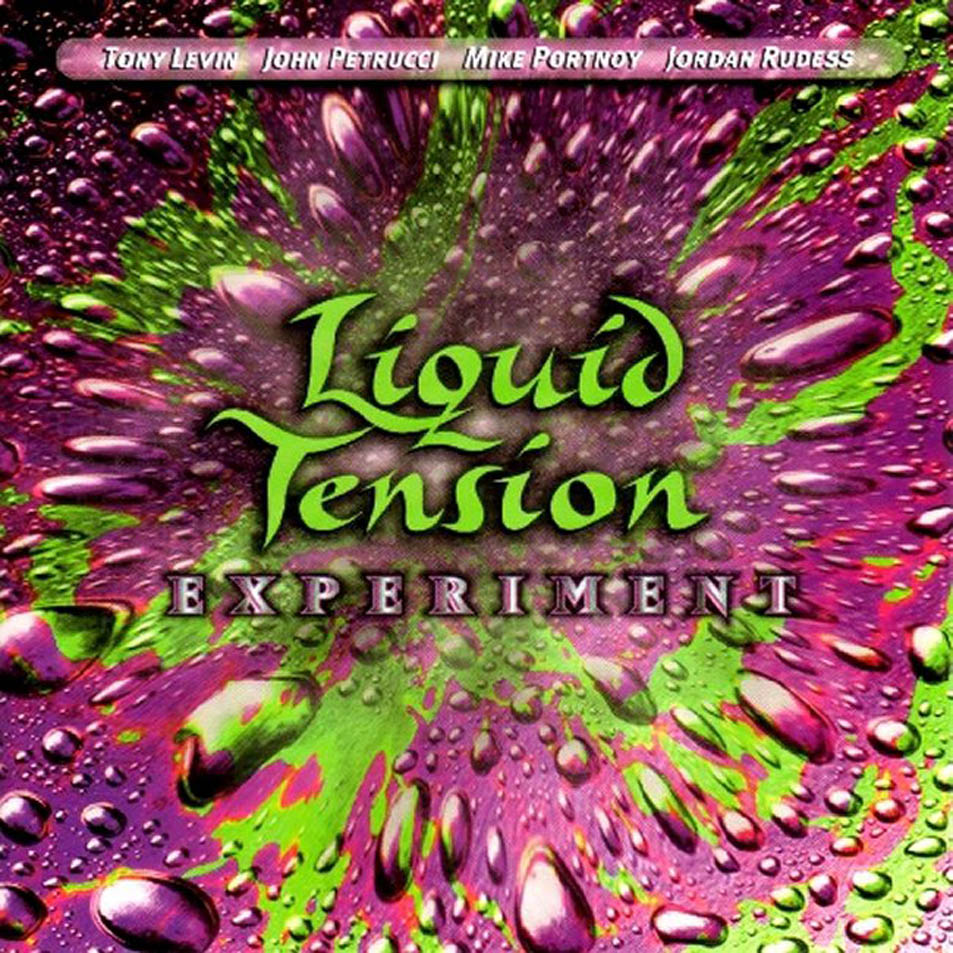 You have a lot of options, considering the Magna Carta work with Liquid Tension Experiment and Bozzio Levin Stevens...
You have a lot of options, considering the Magna Carta work with Liquid Tension Experiment and Bozzio Levin Stevens...
I know. I love that stuff. In fact, the Bozzio Levin Stevens album, we were just talking about maybe touring with that in the winter.
It's quite a change going from the King Crimson stuff, which is pretty incendiary, to Liquid Tension Experiment, which is basically speed metal, then to your own album. It's quite a combination.
Even though it might sound like I do everything, I really don't do everything I'm asked to do. There are some that I pass on, or that I'm too busy to, or that musically don't suit me. But Liquid Tension was a stretch for me – it was much more technical than I'm used to playing – so that was kind of way off the path of what I usually do. But progressive stuff like with Bozzio Levin Stevens and with King Crimson is what I usually do, and – how should I put it? – the mellower music that I did on Waters of Eden is just another part of the music that I want to express, and I really miss doing that if I play too much progressive – how should I put it? – guy-oriented, from-the-brain music. That's fine, I like playing it, but it's just not all that there is. There's more music that I need to express, and if I go too long without it, then it builds up into a whole album.
It's a matter of achieving musical balance.
Yeah, but not all bands want to have a balance. Some bands want to– As you know, Liquid Tension Experiment doesn't want to sing an Italian ballad!
The first Liquid Tension has more of a variety on it between a semi-jazz grooves–
We did more jams on that one.
The second one was relentless.
Yeah.
You've worked in a wide variety of situations, from highly composed ensembles to open-ended improvisation. Do you approach them differently? Do you prefer one to the other?
I don't have a preference, and I don't have a plan of how to approach music. I have been in a lot of musical situations, both live and in the studio. It's pretty easy because I'm a bass player. It's pretty simple: I go in and I listen to the music, if someone else made up the music – if it's somebody's album. I listen to the music and then I hopefully like the music – I almost always do – and then I just try to help fashion a bass part that'll be the best for that music. And it can be very different, the bass parts, and I can have different instruments, it really depends on the music. Until I hear the actual piece, I don't really know whether I'm going to play an upright bass or a cello with a bow or a heavy rock part.
You just carry them all with you?
Well, in a perfect world I have all my instruments. But I almost always have them send me tapes of the songs beforehand. Even if it's an artist who's known for ballads, I still won't necessarily play the same kind of part. It really depends on the music.
Has there ever been a session that you took, and you went in, and you ended up feeling kind of out of place, like you really weren't the right guy for the job?
There have been many, many, many.
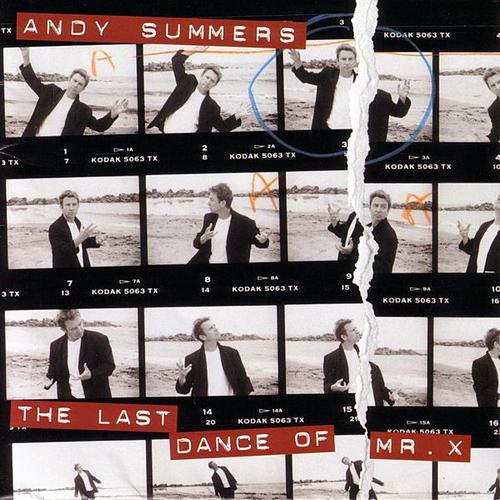 I don't suppose you'd name names...
I don't suppose you'd name names...
There was a Chaka Khan album way back – maybe her first solo album – when god knows why, the producer brought me in to play funk, which I can play, but not as well as the guys who live in the genre. And many times in jazz situations... Andy Summers, two albums ago – something about Mr. X... [ed. The Last Dance of Mr. X] Actually, when he called me to do the album, I said, "Well this is straight ahead jazz, Andy. I'm not the guy." 'Cause Andy can play jazz or rock, and he kind of indicated that it wasn't jazz, and I got there and it very much was straight ahead jazz. And I did do the album, and I was there and committed to do it, but I felt very out of place. And again, it's not that I can't play that style, it's just I don't hear my bass playing in that style being comparable to many of the guys who live in that genre and devote their musical lives to playing that stuff. I don't really want to be caught trying to just copy them, so it's an awkward situation for me.
How do you adapt your playing to different drummers? For example, with Terry Bozzio as compared to Jerry Marotta?
Again, I don't have a sentence I can say about that, 'cause I don't have a plan. I just kind of listen to what's being played, and even then I don't intellectually make a decision what to play. I've been a bass player so long that I just kind of... From some inner part of me, I just get a feeling of "Hey, what if I played this?" And I don't know what this is, because right now it's theoretical, but for instance I might think, "How 'bout if I just dampen the strings and play some very sparse two notes that are very rhythmic and African-sounding?" I might say that, or inside I might just feel that. "How 'bout I take this Stick and play very busy and very high and completely different than what the drummer's doing?" Any of those things might happen. I don't really think about it. Not only that, now, even when I'm hearing it, I don't think about it.
So it's easy for you?
Oh, yeah, it's easy! It's making music. We're talking about not only me, but all of the guys I work with. We're talking about musicians who are not only professional, but spent their whole lives playing the one instrument, doing what they do. It's like a bowler goes to a bowling alley sees a different configuration of pins. He doesn't really need to consult his chart, he knows what to do. I don't know what to do in the bowling case, but in the bass case...
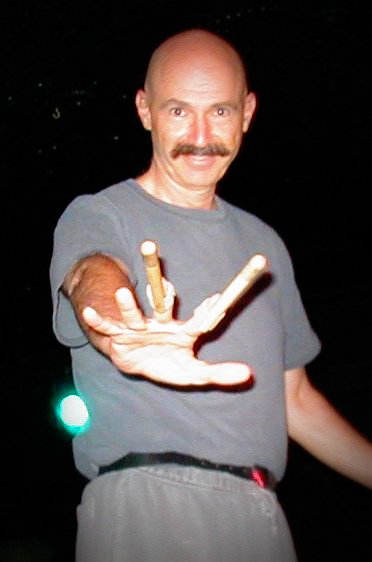 How old were you when you first picked up the bass?
How old were you when you first picked up the bass?
I was about ten. So I'm fifty-four now and I've been doing nothing since! I have a wonderful family and I have some hobbies, but I don't play guitar, and I play only minimal piano. I am a bass player. The reason isn't because I'm so dumb that I'm unable to do anything, the reason is 'cause I really love bass playing, and I don't need to take it to be something else than it is. I like to, given the opportunity, to try and stretch the boundaries, but I'm very happy just playing the rote parts that are written, that can make people dance and feel good. I was when I was a kid, and I haven't changed in that way. So in a way, I'm a very lucky guy, that I'm doing what my inside really wants to do. I do other things, but I have no plans to stop playing the bass until people don't want me to play with them anymore.
What is your very first memory of being on stage in front of an audience, whether it was with the bass or something else?
That's easy. I've written a book of anecdotes about things like that, so some of them are very vivid in my mind. The book is called Beyond the Bass Clef, and is in some bookstores. My first band was called The Cavaliers, and I was maybe eleven, and we played at school dances. So I started in whatever – seventh grade? sixth grade? – playing at school dances, and I was nervous. This was an instrumental band. I was playing an acoustic upright bass – really, rock wasn't quite the same in those days – so I was nervous, and I saw all the kids I go to school with out there trying to dance to our music. I do remember it pretty well.
Speaking of your book, have any drummers who read it commented on your chapter about drummers, where you refer to them as "child-adults"?
Not a single drummer has even read it, I don't I think. I could be wrong, but none of the many drummers I know has read it or commented about it. In fact, I just worked with Steve Gadd, a wonderful drummer. We did an album together in Los Angeles last week, and I said, "Steve, didn't I send you a book a couple years ago?" And he really didn't remember I had sent it, and didn't read it, and he didn't remember getting it, and there's a whole chapter about the guy, so I was going to ask him if he minded anything I said in it – which I didn't think he would, but it turned out that he didn't even remember I had written it!
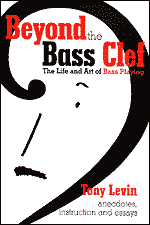 One of the parts I enjoyed the most was your "solitary cyclist" stories. Do you have any good cycling stories that have happened since the book was written?
One of the parts I enjoyed the most was your "solitary cyclist" stories. Do you have any good cycling stories that have happened since the book was written?
Nothing that exciting, I'm happy to say. It's been safe ever since the– I've spent a little less time riding because it's only with the Peter Gabriel band that we have the luxury of taking bikes on the road, 'cause he has a bigger tour trucks and stuff. And I haven't done a Peter tour in quite a few years. Even the last tour we did that ended in '94, we were more motorcycling than bicycling. But I do bicycle a lot in my free time. Thankfully no accident stories. When Peter tours again, I plan on having a lot of stories, of all kinds of adventures.
Is it exciting touring with him?
Yeah, Peter gets bored just going from gig to gig, and he likes to find adventures to do in between the shows in different places, and we've had many.
Do you like adventure?
Not particularly on my own, but most of the kind of further-off-track stories in my book came from Peter Gabriel tours. That's when we go white water rafting, and up some mountain pass, motorcycling to the Grand Canyon, or sailing off the coast of New Zealand for two days to the Indian Ocean, which is fun.
Have you had any close calls?
I had that bad bicycle accident that I wrote about in the book. A hotel was bombed that I was in the Basque area in the north of Spain, where that happens a lot, but nobody was hurt.
Were you in the hotel at the time?
I was in the hotel, but I wasn't in the lobby. That's not much, considering twenty or thirty years of touring. No planes going down.
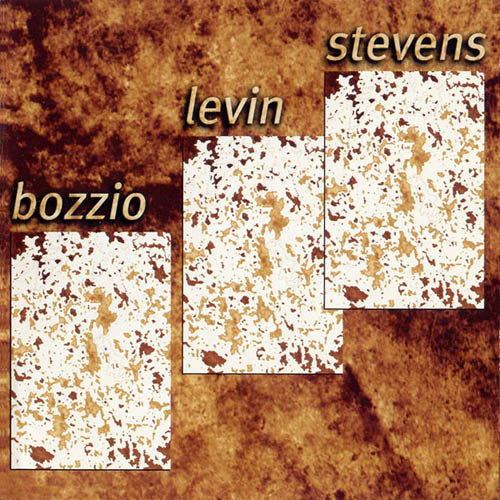 Let's talk a little about the latest Bozzio Levin Stevens release. The press release talks about how the newer album, Situation Dangerous, is a bit more composed.
Let's talk a little about the latest Bozzio Levin Stevens release. The press release talks about how the newer album, Situation Dangerous, is a bit more composed.
It is. The first one was basically a bit composed, but we jammed quite a bit, and we enjoyed that, but we didn't have that much time to write. This time, we had a little bit more time to write and we're faster at it. We're more used to it, and we didn't need to jam. Maybe we should have...
Some people seem to prefer the first album.
I like the first one very much too. I have nothing against the jams, I just felt like we took another step, not a huge step, but a small step towards being the band that we are, being our own identity, and because we knew it going in, we just kind of are a little more ourselves than we were on the first one. I know Terry Bozzio did miss there being jams – he wished there were more jams – so who knows what the next one will bring? But what we really need if we're going to be a band, I think, is to tour and to play live, and see where that takes the music. And I'm trying to do that, but it's not logistically the easiest thing to put together. So who knows? In the future hopefully we'll tour and the music will take on some stuff, and we'll probably come up with new music while we're on the road.
For this album, did any of you come into it with some pieces partly written?
Always. That always happens. Steve Stevens especially, he had a lot of great ideas this time. Sometimes we'll come in with ideas that we'll try. I mean, the first two or three days we just did that. We didn't do complete pieces, we did segments, and the other guys would learn them, and we'd record them, and almost half of it we had to dump. It just wasn't suitable for the album.
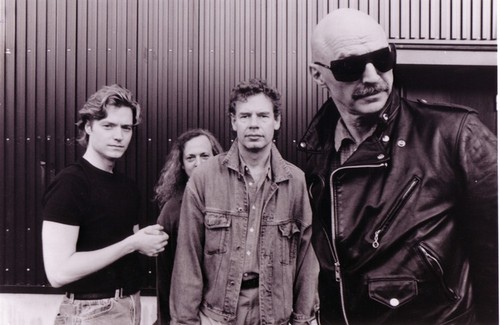 Are there any future plans for the BLUE (Bruford Levin Upper Extremities) group?
Are there any future plans for the BLUE (Bruford Levin Upper Extremities) group?
Well, that's funny because two of the guys are always calling me: "Let's do some more stuff." And then the other guy, Bill Bruford, is always busy with his stuff, and so I ask the others especially Chris Botti, our trumpet player, who's now on the road for two years with Sting, so he's not available. But when he asked me to do it, I said, "Don't bother asking me! I'll do it. Go ask Bill." And Bill kind of would like to do it, but he has other projects that are further up on the list for him. So until Bill has time and wants to do it, we won't. And then if Bill does want to do it, we still have the additional logistical thing of everybody's schedules working out, which isn't easy. I love the band. I should – I put it together! And we had a great time live and I love the live album. So I very much want to work some more. Ironically, it's one of the few bands that I do where we could make it work financially. We could just go play, and people would like it and come see it. It's kind of hard to start up with Bozzio Levin Stevens or do my own Tony Levin Band tour. There's a small audience, so we have to be very careful and not book too much, 'cause it really barely pays for itself. So ironically BLUE, the one band that would pay for itself easily, isn't so easy to put together.
You've used your web site to distribute your music. Do you feel that works pretty well for you?
First of all, I've had a web site quite a while. I've had internet presence and interest for a long time. I got email in the very early eighties, maybe 1980, maybe even before, when there was no AOL. There were some other systems.
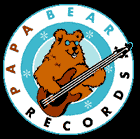 Back with old modems that you put the phone on?
Back with old modems that you put the phone on?
Yes, you had suction cups. But anyway, having been on it so long, I'm kind of in that school of people who don't really think a site should be for profit. So my site – I started calling it papabear.com so I haven't changed it to tonylevin.com [ed. this has since changed] – but really Papa Bear is only kind of a segment off of it, Papa Bear being my record label, which only sells my stuff. And I keep what I think is a pretty low presence of trying to sell things. I admit sometimes I get excited about a new record, like the Bozzio Levin Stevens one, which I don't even sell, but then I'll link to some way to sell it, and if it's a record of mine then of course I'll mention it, and my book I mention, so it just kind of has – and even when it started and it was only Papa Bear, I put on Funk Fingers just for the fun of sharing that. I only made more because I had the web site and I wanted to share it with bass players. Anyway, it's evolved more into what I think is a way that people who are interested in progressive music can just see what it's like behind the scenes. I know I get a lot of email from people who just thank me for having the diary up there and the photos, and they don't really go there to buy my records. And that's fine with me. And so far that's a viable thing for me because I have so much interest in the web that I'll devote the time to keeping the page interesting and up to date, and I don't really need to have income from the web to make it worthwhile.
One last question: how do you like Construkction of Light?
I like it very, very much. I don't think I've had time to actually listen to all of it. I have mixed feelings, as you can imagine, [about] a Crimson album that I'm not on. And the better it is, the more I wish I was on it! But also it's a mixed thing, because I also have an appreciation of the guys playing, and I can hear little things in there that other people don't recognize from rehearsals that I was at, and stuff like that. So it has a lot of meaning for me just as music. I'm pretty comfortable by now with the fact that they're probably going to continue that incarnation of Crimson. I'm still technically in Crimson, but it sounds to me like an album that deserves to have another album of the same line up.
Filed under: Interviews, Issue 22
Related artist(s): Tony Levin
More info
http://www.tonylevin.com/index.shtml
What's new
These are the most recent changes made to artists, releases, and articles.
- Release: 8x8 - New Data New Day
Updated 2024-04-24 12:13:42 - Review: Aglaia - Inner Enchantments
Published 2024-04-24 - Release: 8x8 - Life During Wartime
Updated 2024-04-23 17:55:39 - Review: Cheer-Accident - Vacate
Published 2024-04-23 - Release: s475e - Next Stop Earth
Updated 2024-04-22 16:06:30 - Artist: s475e (Darius Speier)
Updated 2024-04-22 16:05:44 - Release: Jim Black & the Shrimps - Ain't No Saint
Updated 2024-04-22 15:59:58 - Release: Jim Black Trio - Reckon
Updated 2024-04-22 15:58:55 - Release: Jim Black - Malamute
Updated 2024-04-22 15:57:31 - Release: Jim Black Trio - The Constant
Updated 2024-04-22 15:56:17 - Release: Natsuki Tamura / Jim Black - NatJim
Updated 2024-04-22 15:54:36 - Release: Mono - Oath
Updated 2024-04-22 15:49:48 - Release: The Cyberiam - Unobtainium
Updated 2024-04-22 15:46:54 - Release: Pete Ham - Keyhole Street
Updated 2024-04-22 15:44:27 - Release: Pete Ham - Golders Green
Updated 2024-04-22 15:43:29 - Release: Pete Ham - 7 Park Avenue
Updated 2024-04-22 15:41:03 - Release: Human Feel - Gold
Updated 2024-04-22 15:35:23 - Release: Ikue Mori - Obelisk
Updated 2024-04-22 15:33:39 - Release: Human Feel - Galore
Updated 2024-04-22 15:25:33 - Release: David Binney - Balance
Updated 2024-04-22 15:20:23
